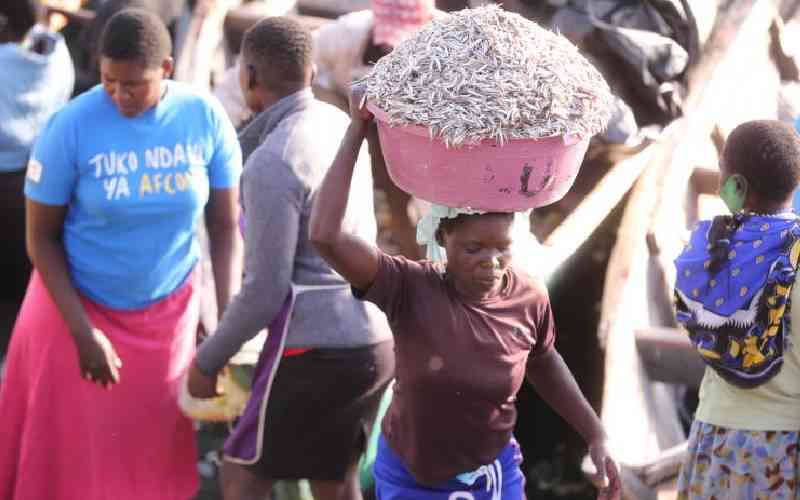
Following the conclusion of the sixth Global Entrepreneurship Summit (GES) held in Nairobi and co-hosted by President Uhuru Kenyatta and US President Barack Obama, women emerged one of the biggest winners.
In his address to delegates, President Obama warned: “Any nation that fails to educate its girls or employ its women and allow them to maximise their potential is doomed to fall behind in the global economy.”
And he backed this pronouncement with money. Mr Obama announced he had secured more than Sh100 billion in new investments for emerging entrepreneurs, with half of this amount reserved for supporting women and youth.
But just as this bounty was being announced, one woman’s entrepreneurial efforts were under threat. Tabitha Karanja’s company, Keroche Breweries, was to be closed over what the Kenya Revenue Authority (KRA) said was its failure to comply with tax laws.
To many budding women entrepreneurs in Kenya, Mrs Karanja has come to embody the spirit of women in business.
When Kenya’s beer market was dominated by one foreign-owned brewer, there were very few men who had the guts, let alone the capital, to venture into this high-risk business, but Karanja stepped up to the challenge.
Karanja, who attended GES as a delegate, has had a bruising entrepreneurial journey, battling unfavourable legislation and attacks on her factories and her character.
“I keep fighting because I have seen what I can do, what Keroche can become. I believe in my dream and I am not willing to give up on it,” she told Business Beat in an interview last week.
“We have long glorified foreign investors, but even locals can make a difference. Our brands can compete against global giants. However, we need the Government to protect our businesses, not fight them.”
Many women in business, however, have not had the opportunity to pursue and fight for their dreams. And this is despite Kenya putting in place several policies aimed at empowering women economically.
The Government has earmarked billions of shillings for women this financial year, including Sh850 million from the Uwezo Fund, Sh500 million from the Women Enterprise Fund, and Sh300 million from the Youth Enterprise Development Fund.
State agencies are also required to reserve at least 30 per cent of their procurement tenders for women, youth and persons with disabilities.
According to the Kenya Association of Women Business Owners (KAWBO), this bring the amount of money women can access to about Sh300 billion — six times more than Obama secured.
Public procurement
Stay informed. Subscribe to our newsletter
Unfortunately, of the about Sh200 billion allocated to women, youth and persons with disabilities in the 2014-15 financial year, only a paltry Sh20 billion was taken up. Why?
Because most women do not know of the existence of these monies, said Jane Kagiri, an IT consultant. Her company, Creative Edge Solutions, regularly bids for Government tenders.
“The Government has not sensitised women enough on the availability of the funds and how to access them,” she said.
Yet, as Obama said to riotous applause at the summit, “Women are powerhouse entrepreneurs. The research shows that when women entrepreneurs succeed, they drive economic growth and invest more back into their families and communities.”
Irene Mumo would like to supply the Rural Electrification Authority (REA) with electric cables. For two years, she has bid for this tender, but has yet to get beyond the pre-qualification stage. She believes it has something to do with her being a woman and the perceptions this creates in business.
Ms Kagiri acknowledged that there are some “old men” with “old school” ideas who are not eager to see youth and women benefit from these funds. As Obama put it, such men are stuck on retrogressive traditions that deny women entrepreneurship and employment opportunities.
Going by such traditions, added Kenya Women Holding CEO Jennifer Riria, women are to be seen, not heard, with entrepreneurship and employment considered the preserves of men.
But discrimination against women is not just a national problem; it’s global. According to the World Bank, while women make up close to 50 per cent of the world’s population, they only comprise 41 per cent of the global labour market.
Vital Voices, a women’s advocacy group started by former US Secretary of State Hilary Clinton, notes that “only one per cent of the world’s landowners are women.”
A 1999 baseline survey showed that most women entrepreneurs in Kenya were in the micro and small enterprises (MSEs) sector, and made up 47 per cent of the businesses.
They tended to operate enterprises largely associated with women’s roles, including hair salons, restaurants, retail shops and whole-sale outlets.
Women also operated smaller MSEs than men and earned less. According to the survey, women earned an average gross income of Sh4,344 per month compared to Sh7,627 for men.
Less profitable
According to Ms Mumo, even in public procurement, women seem restricted to certain business lines, which is why she thinks she has not won a tender to supply electric cables.
“For tender documents, the time given for executing the bid for women and general contractors is the same. But this is not fair because a sector such as manufacturing is a new area for women. Some of the technical tender documents are written with certain people in mind. That is why I think there is stereotyping,” she said.
Further, Mumo said, even when women win bids in technical areas, they are likely to sub-let a good portion of the contract, which means they end up not being the primary beneficiaries.
This sentiment is echoed by a World Bank report on gender equality and development that found that in almost all countries, women are more likely to engage in low productivity activities. They also tend to manage smaller firms and concentrate on less profitable sectors.
The fact that women can be paid less than men for the same job, even in developed countries, shows how deep-rooted discrimination against women is, said the director of Vital Voices Africa, Celena Green, who was also in the country for the GES.
“Traditionally, the assumption is that the man will need more money because he may be the breadwinner. Now, you have non-traditional households where both the wife and husband are breadwinners, so you are hurting the family when you short-change one person,” she said.
Women have very little control over resources, according to the World Bank. Some working women do not even know how much they get paid for their job because their husbands cash their salary, and in Kenya, just 5 per cent of registered landholders are women.
Such factors have hurt women entrepreneurs’ chances of accessing credit, a study by the International Labour Organization (ILO) and the Centre for Enterprise Development (CED) in Nairobi found.
Dr Riria recalled that back in the early 1990s when she was starting out, her biggest hurdle was positioning women in the financial sector.
“In those days, no one wanted to deal with women. One banker asked me: ‘Jennifer, do you want your women with their baskets to crowd my counters?’”
The ILO report notes that women who would like to start their own businesses have to overcome a lack of seed capital, lack of awareness of existing credit schemes, high interest rates, lengthy and vigorous procedures for loan applications, and lack of collateral security for finance.
Official policy
And even when women win tenders from State agencies, issues around funding turn the victory into defeat.
Doreen Muruiru, who deals with branding, said getting the tenders and LPOs is not the issue, credit is.
“Even with the certificates you need, you have to come with a log-book or some other security,” she said.
“I have been told to my face that ‘this thing for women is not working’.”
However, according to a banker who did not want to be named over the sensitivity of the issue, banks do not have an official policy of making it more difficult for women to get loans than for men.
“But we normally have persona biases from bank representatives. Some employees profile or stereotype women. So when a woman comes to ask for a loan, this employee will struggle to trust her with, for instance, Sh1 million,” he said.
And sometimes women’s virtues are a stumbling block.
“We also worry that women are too honest. If she comes to tell you she got a tender worth Sh80 million, you have to wonder if she will be corrupt enough to chase after her money and pay the bank back.”
He added that women also tend to give up faster than men do when loan applications are being appraised.
“There might be one or two items missing in an application, and on being told this, most women give up, while men haggle and ask you to find a way around the issues.”
There are also legal and regulatory barriers that take up a lot of time, which is something many women entrepreneurs, who are also entrusted with looking after their families, have precious little of.
These bureaucratic bottlenecks have spawned yet another problem: men soliciting sexual favours from women working against great odds to make some headway in business.
It matters that these issues are tackled because women’s full participation in society has been proven to accelerate development, equality and peace, according to Vital Voices.
Moreover, economists endorse investment in female entrepreneurs as smart economics.
According to the World Bank, this means that involving women in business boosts profitability and productivity.
r example, if women farmers were to have the same access as men to fertilisers and other inputs, maize yields would increase by about 17 per cent in Malawi and Ghana, notes the institution.
And eliminating barriers that discriminate against women working in certain sectors or occupations could increase a country’s labour productivity by 25 per cent.
According to WAYBO, a women’s advocacy group that guides entrepreneurs on procurement: “For every dollar (Sh102) that you put in women’s hands, 80 cents (Sh82) goes to the family.”
As global growth gets sluggish and the need for structural change becomes more urgent, the world is sitting up and taking notice of such figures.
In Kenya, financial models are changing to address women’s unique needs.
Table banking — where members gather monthly and put their money on a table, which then becomes immediately available as loans — is helping to deepen financial inclusion among Kenya’s rural women and improve livelihoods.
As African Renewal notes, the practice has eliminated banks fees, waiting periods for loan approvals and many other obstacles faced by women who need credit but lack security.
Exploit benefits
Microfinance institutions in Kenya are also changing credit processes to extend banking services to women.
Rather than give loans to women against physical collateral, such as title deeds, they are using what is known as social collateral, where they lend money to groups, not individuals. In this way, group members become guarantors for individual members.
Ms Green added that research from the International Trade Centre (ITC) has shown that procurement is the best way to place women in the entrepreneurship space.
Kenya has been praised for its efforts to channel funds to women entrepreneurs using this model. The country is ranked fourth globally when it comes to giving business opportunities to women through procurement.
But women cannot fund most State tenders using micro-credit. Further, it has been noted that for the 30 per cent procurement rule to have more impact, women need to be empowered to go beyond ‘feminine’ business lines, such as supplying flowers or water.
For Riria, it is time for women to go macro if they hope to exploit the benefits that are coming their way.
“Women need to begin developing knowledge-based businesses that can compete across the region,” she said.
[email protected]
 The Standard Group Plc is a
multi-media organization with investments in media platforms spanning newspaper
print operations, television, radio broadcasting, digital and online services. The
Standard Group is recognized as a leading multi-media house in Kenya with a key
influence in matters of national and international interest.
The Standard Group Plc is a
multi-media organization with investments in media platforms spanning newspaper
print operations, television, radio broadcasting, digital and online services. The
Standard Group is recognized as a leading multi-media house in Kenya with a key
influence in matters of national and international interest.
 The Standard Group Plc is a
multi-media organization with investments in media platforms spanning newspaper
print operations, television, radio broadcasting, digital and online services. The
Standard Group is recognized as a leading multi-media house in Kenya with a key
influence in matters of national and international interest.
The Standard Group Plc is a
multi-media organization with investments in media platforms spanning newspaper
print operations, television, radio broadcasting, digital and online services. The
Standard Group is recognized as a leading multi-media house in Kenya with a key
influence in matters of national and international interest.









